Verizon LTE nirvana, can it last?
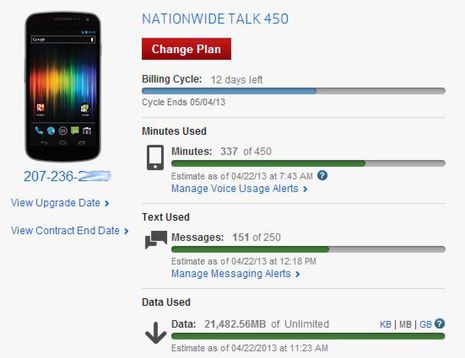
I lucked out. Just look at all the data I've been slurping through my Verizon Galaxy Nexus cell phone while living and working afloat. Up until this month I didn't think that using 21,482 megabytes on a $60 data plan was possible without repercussions -- like Verizon throttling me down or even saying "bye-bye, buster!" But apparently it's perfectly OK for me to keep right on slurping at this piggish pace. Am I just enjoying a short term sweet spot?
When describing my three-layer data strategy last fall, I was a little shy about detailing the cellular part. I am one of the millions of Verizon users who have a grandfathered $30 unlimited data plan, and also one of the much smaller cohort who luckily updated to an LTE-capable phone before Verizon stopped selling them under an unlimited contract, but I had the strong impression that "unlimited" had certain limitations. When I first went on Verizon's plan in 2010 I was darn happy that a $10 app let me tether the phone to the boat's computer via USB cable but was warned that if I used more than 5 gigabytes Verizon could cut me off siting that endless small print known as "Terms of Service".
So last fall I was still happily using EasyTether but doing so quite judiciously. And when mistakes were made -- be careful how you set up GoogleDrive on the boat PC, kids -- I'd add Verizon's mobile hotspot option to my account, which meant I could legitimately use 3 Gigs of cell data on PCs and pads for another $30. I figured that even if my 'unlimited' tethering went over 5 gigs, Verizon might appreciate my willingness to pay more for data...
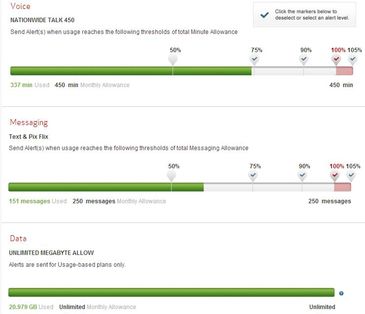
I really like how Verizon lets customers know exactly what's going on with their account via the MyVerizon site, their smart phone apps or even by calling its elaborate customer service system. I could easily see how much data I was using and could enable or disable the hotspot option without penalty. Also, as illustrated above, Verizon offers a slick alerting system so you don't actually need to check in on usage. (Letting us rack up expensive extra minutes, texts, and megabytes might be profitable in the short term but not over the long game.) However, that alert screen as well my detailed billing looks different than it did last fall. Back then they differentiated between my 'unlimited' and hotspot plans, and I was nervous about what that revealed.
Things change. When I left marina WiFi behind three weeks ago, I was quite bummed to discover that EasyTether wouldn't connect to Gizmo's PC any more. Would I only have 'unlimited' on the phone's little screen and be limited to 3 gigs a cruising month on all my other devices unless I found or purchased WiFi services, or send Verizon more money? That's what I feared as I learned how the latest Android revision made third-party tethering difficult even as the FCC told Verizon it couldn't limit tethering. Maybe that latter news is why Verizon suddenly lumped all my regular and hotspot data usage into one unlimited bundle, I don't know, but when I realized that I decided to quit messing with EasyTether and other ways to make my phone do something the service provider didn't mean it to do. Instead, I'd see if Verizon's new policy really meant unlimited data for $60/mo...
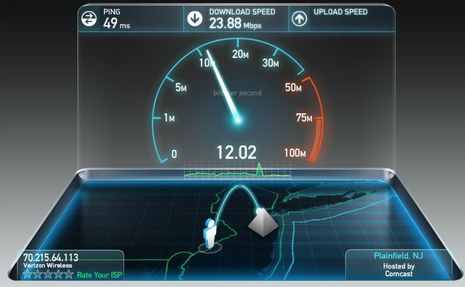
So far, so good. But you do need some speed to use a lot of data, and, wow, does LTE have it! I've seen a lot of snappy 4G service during these trips, thanks in part to Wilson cell amps, but this morning's speed test results are extraordinary. I don't think I've ever seen 24 Mbps download speed on my home office connection and I pay Time Warner for a premium plan. You also need to download a lot of data...
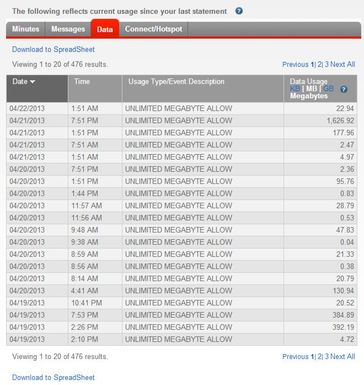
The screen above is another example of how transparent Verizon is about customer usage, but what you should particularly note is the 1,626 megs I used last night (and I don't stay up late). How did I manage that? Easy: Netflix streaming at HD quality and without burps to the Visio TV/monitor for two hour-long episodes of a trashy cable series I've gotten into. And I mean easy. As shown on the screen below left I enabled the phone's WiFi hotspot feature when I got to this anchorage yesterday and it's been sitting in its cradle with charging wire attached and a near perfect LTE signal (middle screen) ever since. I have Gizmo's Rogue Wave pointed at the PanboAndroid hotspot -- though it sees dozens of other APs in this Jersey shore town, none are fast and friendly -- so the PCs and pads have all been well connected.
Admittedly, it's not been so easy when underway or in less well served spots, which is why I appreciate the KVH V3-IP (though even a Russian oligarch might blanch at the bill for 26.5 gigs of satellite data). Will I ever see cellular data so fast and inexpensive again? I have no idea. I did call Verizon today and a sweet lady assured me that I really do have unlimited hotspot data, but she also said that I couldn't get it again if I want to upgrade my phone with a new contract. I've also read that Verizon is throttling 'unlimited' 3G users and I've seen many arguments raging over whether they'll kill 'unlimited' altogether and/or if it's even possible given our lust for streaming video. It's neat, though, that the most informed argument I've seen is on Verizon's own forum.
This line got my attention: "Asking for unlimited data at this point is like satellite internet customers asking them to increase the speed of light so they can have sub 500 ms latency." Of course I'm curious how other boating cell users are faring and where you all think it's headed. But I may be offline watching some bad TV for a while...
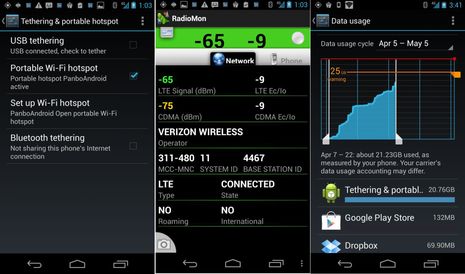

 Share
Share
Hi Ben,
We've got quite a bit of experience in this area. The overarching "logic" behind the level of service you receive is something called "SMP" for "Subscriber Management Policy". The basic idea is that you are on a shared service with every other Verizon customer using the particular cell tower. If you're the only user, you're not harming anybody else by downloading a lot of data so they give it to you -- kind of like a first class upgrade when the plane is empty. When the convention comes to town, automatic programs kick in to see not only how much data you download, but how fast. If you start streaming high def movies from Netflix or via some peer to peer protocol that is difficult to block, the automatic throttlers kick in to slow you down for a period of time.
When cell phone companies launch new services like 4G, they don't have many subscribers so they can afford to offer "unlimited" services like yours. This is what Sprint seems to be doing in their recent ads. As the networks fill, they try to enforce new limits. When you get that fancy new phone for free sometime in the future, the "catch" will be a new airtime program. You might be better off buying your next phone and staying on the "sweetheart" deal you've already got!
There's a company that makes the equipment used to create SMP programs called Allot. Its great equipment (we use it on our satellite network), because it assures a much higher level of performance for all users of a network. Most people would be disappointed if they couldn't download their email because the kid in the boat next door was watching high def streaming movies and hogging all the available bandwidth in the area. Allot has a ton of case histories and plan logic documents if you're interested in understanding how the decisions are being made. Here's the link: http://www.allot.com/mobile-broadband-providers.html .